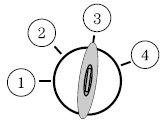Starting the engine


1. Turn the key to 3 (on) without
turning the key to 4 (start). If there
is difficulty in turning the key,
rotate the steering wheel until the
key turns freely. This condition may
occur when:
• the front wheels are turned
• a front wheel is against the curb
2. Turn the key to 4 (start), then release the key as soon as the engine begins cranking. Your vehicle has a computer assisted cranking system that assists in starting the engine. After releasing the key from the 4 (start) position, the engine may continue cranking for up to 10 seconds or until the vehicle starts.
Note: Cranking may be stopped at any time by turning the key to the off position
3. After idling for a few seconds, release the parking brake, apply the brake, shift into gear and drive.
Note: If the engine does not start on the first try, turn the key to the off position, wait 10 seconds and try Step 2 again. If the engine still fails to start, press the accelerator to the floor and try Step 2 again, keeping the accelerator on the floor until the engine begins to accelerate above cranking speeds; this will allow the engine to crank with the fuel shut off in case the engine is flooded with fuel.
See also:
Smart unlocks
The smart unlock feature is intended to prevent you from unintentionally
locking your IA key inside your vehicle’s passenger compartment.
When you lock your vehicle using the driver or passenger ...
Plastic (non-painted) exterior parts
Use only approved products to clean plastic parts. These products are
available from your authorized dealer.
• For routine cleaning, use Motorcraft Detail Wash (ZC-3-A).
• If tar or grease spots a ...
MyLincoln just the start for technology-packed 2011 Lincoln MKX
The industry-first MyLincoln Touch experience, powered by Lincoln SYNC®,
replaces traditional vehicle buttons, knobs and gauges with clear, crisp LCD
screens and five-way buttons like those found ...
